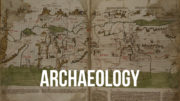Steven Law | Patterns of Evidence
Summary: New evidence of an inkwell and reassessments of past evidence of messages from the Judean fort of Arad reveal that reading and writing was not as rare in ancient Israel and Judah as many scholars had previously believed.
And these words that I command you today shall be on your heart. You shall teach them diligently to your children … You shall write them on the doorposts of your house and on your gates. – Deut 6:6-9 (ESV)
Literacy, Judah and the Bible
Last week we profiled new archaeological evidence, that was a surprise to many, showing that Judah was a very robust centralized kingdom in the 7th century BC, supporting the biblical account of conditions at this time. Now, new evidence is coming forward indicating that literacy rates in different periods were not as low as previously thought.
The question of literacy rates in ancient Israel has long been debated by archaeologists. The Bible paints a picture that seems to indicate literacy was at least somewhat widespread – even among common people. But because of the lack of evidence (written documents) many scholars hold the view that literacy was rare – perhaps confined to a very small group of priests and royal scribes. This skepticism not only affects views about the accuracy of the Bible, but also opinions about when its books could have been written or compiled.





